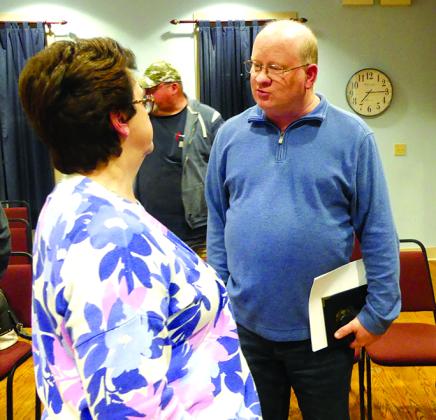Familiar face steps into role as head of Falmouth’s police department

By Carolyn Reid
After concerns about finding qualified candidates who would be willing to take the position of police chief with the current budget, Mayor Sebastian Ernst and Falmouth City Council had to look no farther than a local family whose name has been synonymous with first response for decades.
Marty Hart, former PC Chief Deputy for Sheriff Eddie Quinn, accepted the position of chief during a special meeting held before the caucus Tuesday night, February 7.
While the mayor was the one tasked to hire the chief, Hart shared with the Falmouth Outlook that a couple of council members approached him to ask what he would have to have to take the job as they debated with the mayor over looking at an agreement for the sheriff to cover the city. Once that agreement hit a dead-end, Ernst called him to see if he would be interested. Hart spelled out his demands regarding salary and other benefits.
He admits he was surprised when Ernst confirmed they could meet Hart’s expectations.
“To be honest with you, I never thought they would meet my conditions,” Hart confesssed to the Outlook. “The pay was more than what the previous chiefs were getting, but the flip side is I’m retired, and the money they would save not paying benefits and retirement. Even with the pay raise, they’re still saving a chunk of money.”
Hart added being home to his list of positives, and Ernst agreed. “He was not only qualified, but he has a strong attachment to Falmouth. His family lives here. He grew up here. This is his hometown. That has value to me. I don’t believe he will let down his family and friends.”
Being from Falmouth, Hart has perspectives of the history of the department. His goals reflect his perception of the past and what he believes he can do. “I want to change the reputation of the [Falmouth] Police Department,” he says. While he knows the department cannot compete with the pay of the surrounding area, “…we can improve it.
“And just because we don’t pay as well, we don’t have to pick and hire the worst of the [candidates,]” he acknowledges. “If I can pick good candidates, everything else will fall in line.” He wants a department that are professional and the “people can count on and be proud of.”
While he points out specifics people talk about when they are discussing law enforcement, he knows he needs experienced, quality officers who know how to handle things such as drug trafficking; but he also knows the city needs young officers who can be trained in handling the crimes that are the most problematic in the area. He plans to get experienced officers and at least one new recruit—hopefully some from the community--in order to keep the city at a level of quality and experience in
he agency.
He says, “If you’re going to have a quality force, you have to pay them more than they can make at McDonalds. The reality of it is, when I first went into the sheriff’s office, the McDonalds worker was making more than the deputies were making—or the police officers. You can’t hire someone off the street.” Once they are vetted, hired, and sent to the academy, Hart says you need to compensate those people to a degree.
“In all the conversations I’ve had with council and the mayor, we are all on the same page. We just need to try to figure out how to make it happen. We’re going to try to provide the service the council and the people of Falmouth want, but we’re going to try to do it with less money.”
Ernst discussed improving the pay, as well. “We’re going to have a smaller, better paid department.” He says he can accomplish that “for far less than what [the former administrations] were spending. There is no need for a clerk when city hall is willing to take up those responsibilities.”
The clerk position being eliminated cost the city approximately $40,000, he says. He believes he can save the city some $200,000 per year by the time he reworks the budget while fulfilling the ordinance requirements of four officers on staff. The object with some of the money is giving the officers raises.
Ernst also expects “our chief to be out on patrol and answering calls when on duty.”
Hart agrees. “The community can’t have any faith in their officers if they don’t see their officers. Even as chief, I want to turn that around. You should see your chief out and about. If your guys need assistance, you can go out and back them up, or you can take a break from whatever you’re doing in the office and get out, walk or drive around town and make connections. That’s not just for the chief; that’s for every one of them.”
Hart wants to see the department do vacation checks, a common duty for the police in all areas, so those who leave their homes for a period can be confident their homes are secure. Hart does not guarantee something will not happen, of course, but he knows by doing those checks, the department can narrow the time frame during which it happened, making it more possible to solving the case.
Business checks are also on the table.
“Main thing, I want the people to have access to me or anyone else who is working the police department. We are a small community; we’re a small department. Frankly, the officer may not know the names of everybody, but everybody in town should know the names of their policemen.
Hart plans to work with Sheriff Jared Brewer. “I have no problems with Jared and I don’t think he has a problem with me. I have full intentions of sitting down with Jared to get on the same page with him before I start at the first of the month.”
That is especially important, he says, as they try to address something like the drug problem in the area.
Hart wants to try new things to see if they work. That includes cuts in budgeted areas to attempt raises for the officers as well as trying new ideas in the department. “It’s all trial and error for at least six months to a year,” he says.
That trial-and-error leads to the one important factor. “The key to all of this is communication,” he says. He has told council and the mayor they need to communicate. “I want council to feel comfortable to call me, I want to be able to call them, and the people out in the community are welcome to call me if they have a concern or an issue. We may not agree on it, but I can guarantee it will be listened to, and it will be handled appropriately and professionally.
“I want to have an open-door policy with every one of them.
While he knows he has a lot of work in front of him, he is ready to be home. “I’m looking forward to getting back into Falmouth. Now, I feel I can take some of the experience and expertise that I have and make a difference in my hometown.”


